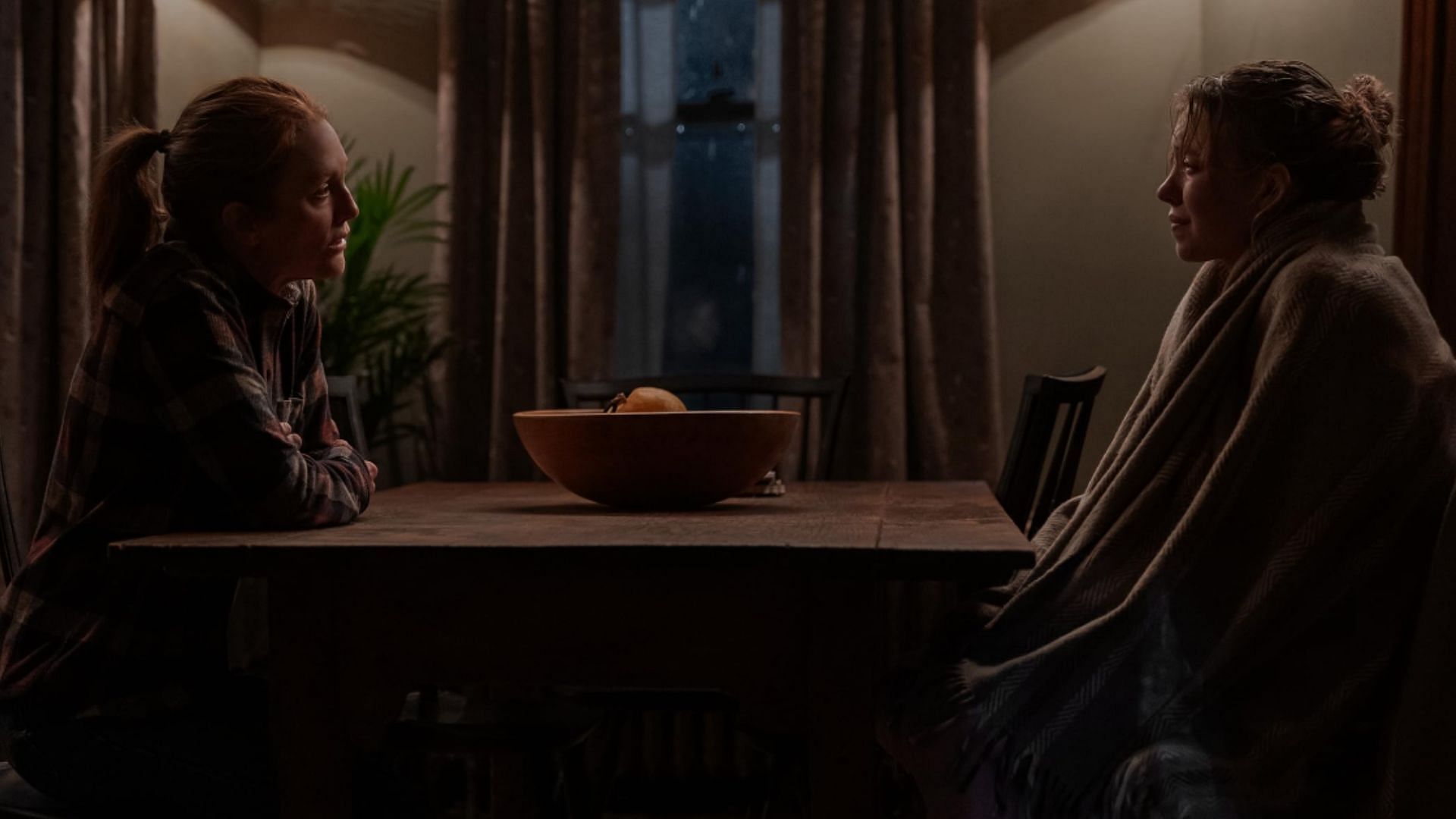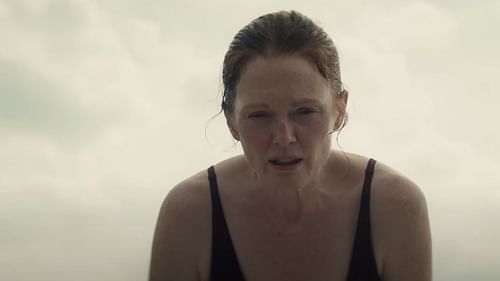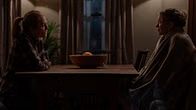Echo Valley ending explained: Did Kate really win or lose everything?

Echo Valley, an Apple TV+ original thriller, was released on June 6, 2025, in select U.S. theaters before streaming globally on Apple TV+ starting June 13. Michael Pearce directed the movie, while Brad Ingelsby (of Mare of Easttown fame) wrote it. Julianne Moore plays Kate Garrett, and Sydney Sweeney portays her troubled daughter, Claire.
The story takes place on a Pennsylvania horse farm and is dark but emotionally raw. It has themes of sacrifice, addiction, deception and redemption.
Kate, a widow who's still grieving, is trying to handle her rural life alone when her daughter, Claire, shows up out of the blue, covered in blood. The story is about a family that goes back and forth between love and betrayal.
When Kate finds out how much her daughter has been lying to her, the story turns into a psychological game of cat and mouse with drug dealers, fake deaths and secrets no one knows. Characters like Jackie (Domhnall Gleeson) and her loyal friend, Les (Fiona Shaw), add a lot of tension and sadness to the story.
Disclaimer: This article contains major spoilers from Echo Valley. Reader discretion is advised.
The final scene of Echo Valley reveals that Kate framed Jackie for murder and arson to protect her daughter, only for Claire to return home once again, uncertain of whether she will be welcomed.
Kate won back her autonomy, safety and control by framing Jackie and reclaiming her life, but she lost the trust and bond with her daughter in the process. In the end, Kate may have survived, but she didn't escape without emotional cost.
Kate frames Jackie: Echo Valley’s masterstroke of revenge

In the climax of Echo Valley, Kate orchestrates a detailed plan to protect herself and eventually punish Jackie for his escalating threats. When Jackie demands money and suggests burning Kate’s horses for insurance fraud, Kate pretends to comply.
However, it's merely a ploy. Behind the scenes, she contacts her old friend Les and devises a scheme to not just protect herself but eliminate Jackie as a threat entirely.
Kate and Les secretly retrieve the real body of Greg Kaminski — the man Claire and Ryan had killed — and hide it inside the barn just before setting it on fire.
They intentionally use a flare, knowing a similar past case had failed due to a traceable flare fragment. Their hope? That police will discover the corpse and match it to Jackie through dental records and circumstantial evidence.
Their plan succeeds. Jackie, who thought he had manipulated Kate into an insurance fraud scheme, is arrested. Emma had seen him on the property; he had been caught buying the flare, and the body in the barn pointed to him.
This important turn of events not only shifts the balance of power between the predator and the victim but also shows how far Kate has come, from being controlled to being in charge herself.
Read More: Netflix releases footage and details of Stranger Things: Tales From 85, to take inspiration from Spider-verse and Arcane for animation
A mother’s trust shattered

From the beginning, Echo Valley hinges on Kate’s unconditional love for Claire. When Claire arrives with blood on her clothes, claiming to have killed her abusive boyfriend Ryan, Kate doesn’t hesitate.
She disposes of the body and even pays off drug debts to Jackie, but the turning point comes when Kate discovers she was deceived. Claire had lied — the body wasn't Ryan's, who's still alive, but that of Greg Kaminski, a man Claire and Ryan likely killed due to a botched drug deal.
This betrayal cuts deeper than any before. Kate, already fragile from grief and emotional exhaustion, realizes that her daughter not only used her but did so knowingly and selfishly. A text on Claire’s iPad — “I can make her do anything” — proves Claire’s intent wasn’t accidental; it was a cold manipulation of a mother’s love.
This is the moment Kate begins to reclaim her agency. The plan to frame Jackie is born not just out of necessity, but from the pain of this ultimate betrayal. The woman who once silently endured emotional abuse is no longer the same.
Also Read: "How are they going to explain" – Viewers react to Disney’s Tron: Ares trailer and the mysteries it raises
The role of Les

Les, played with emotional subtlety by Fiona Shaw, emerges as one of the few unwavering allies in Kate’s collapsing world. While the film focuses heavily on familial dysfunction, Les symbolizes a rare constant, empathy without expectation. When Kate confides in her, Les listens. When Kate needs help moving Greg’s body and framing Jackie, Les agrees.
Her role isn't very interesting, but it's very important. Les is the only one who gets Kate's pain: losing her wife, being alone and wanting to protect Claire. Their relationship is a kind of friendship that isn't often seen in thrillers: it's calm, trustworthy, and healing.
In the final act, their collaboration gives the revenge plan credibility. Les helps dispose of the body and provides the context of the failed flare insurance scam. Without her, Kate's scheme would fall apart. Les isn’t just an accessory to crime — she’s a stabilizing force helping Kate reclaim control.
Read More: Echo Valley (2025): Full list of cast explored
Claire’s return

The last scene of Echo Valley is its most haunting. After everything — lies, betrayal, murder and manipulation — Claire shows up again at Kate’s doorstep. Her eyes are filled with tears, yet her motives remain unclear. Is she seeking forgiveness, shelte or something more sinister?
Kate’s expression doesn’t offer resolution. She neither opens her arms nor slams the door. The ambiguity leaves the story open to interpretation. Claire’s arrival represents the endless cycle that many families with addicted loved ones endure. She comes back not because she's changed, but because she always does.
And Kate? She’s no longer the woman from the film’s opening. She’s hardened, aware and scarred. She may love her daughter, but she’s no longer willing to be destroyed by that love.
Also Read: How to watch Echo Valley at home: Digital release date, platforms, and more
Echo Valley’s core theme: Sacrifice and autonomy

Kate sacrifices her freedom, morals and even livelihood for Claire, but the transformation comes when she begins to fight for herself.
Kate doesn’t just outsmart Jackie — she reclaims her life. After the fire, she receives the insurance payout, restores the farm and resumes her work. The barn roof, once a symbol of her helplessness, is finally fixed. This quiet victory is symbolic. She no longer begs for money or endures abuse; she finds purpose beyond motherhood.
Meanwhile, Claire’s arc is one of collapse. The girl who once manipulated her way through life now finds herself cut off from her last safety net. Whether she gets back in is up to Kate — and the viewers.
Read More: “This type of sh*t that have movies delayed” — Viewers react as fan reportedly sneaks into Avengers: Doomsday set and films a footage
The moral dilemma of Kate’s actions

Kate’s actions, framing someone for murder and arson, are morally questionable. She manipulates the legal system, hides evidence and arguably becomes an anti-hero. But is she wrong, or simply forced into survival?
That’s the strength of Echo Valley. It doesn’t present good versus evil. It’s about complicated people making impossible choices. Kate’s final decision isn't about justice but about reclaiming control. It’s about stopping the endless cycle of being used and abused.
Also Read: “Just let it go man” — Fans react to the announcement of John Wick 5 and debate if another sequel is necessary
An open-ended closure

Echo Valley doesn’t end with hugs or healing. It ends with a stare, a door unopened and a future uncertain. Kate’s love for Claire hasn’t vanished — but it’s evolved. She still listens to her deceased wife’s voicemail reminding her that Claire is sorry. That love lingers. But forgiveness? That will take time.
The film leaves us with a sobering thought: loving an addict is an unending loop. There's no “last time.” And while Kate may be stronger now, the battle isn't over.
Also Read: "It will perform like Scream 6": Fans of Final Destination: Bloodlines calling it the comeback the franchise needed
Echo Valley is streaming on Apple TV+.




